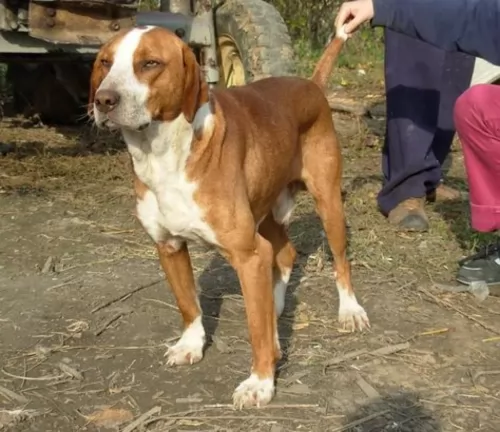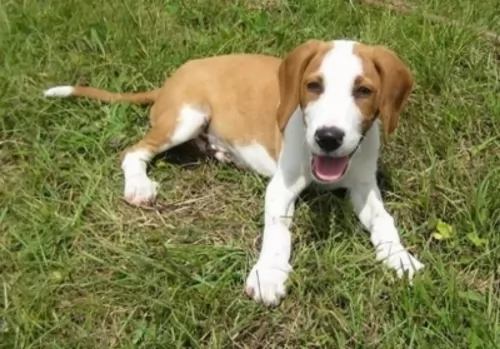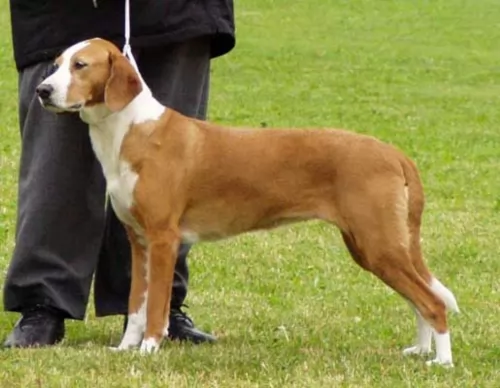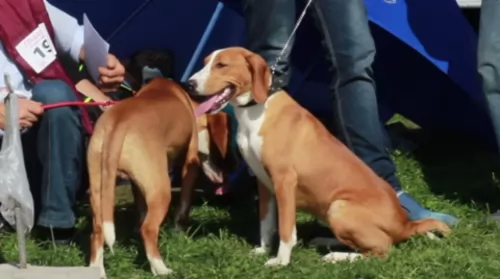 Petzlover
Petzlover Posavac Hound is originated from Croatia but Schipperke is originated from Belgium. Posavac Hound may grow 26 cm / 11 inches higher than Schipperke. Posavac Hound may weigh 11 kg / 25 pounds more than Schipperke. Both Posavac Hound and Schipperke has almost same life span. Both Posavac Hound and Schipperke has almost same litter size. Both Posavac Hound and Schipperke requires Low Maintenance.
Posavac Hound is originated from Croatia but Schipperke is originated from Belgium. Posavac Hound may grow 26 cm / 11 inches higher than Schipperke. Posavac Hound may weigh 11 kg / 25 pounds more than Schipperke. Both Posavac Hound and Schipperke has almost same life span. Both Posavac Hound and Schipperke has almost same litter size. Both Posavac Hound and Schipperke requires Low Maintenance.
 The Posavac Hound originates from Croatia and is believed to have descended from the Molossian.
The Posavac Hound originates from Croatia and is believed to have descended from the Molossian.
The name Posavac Houndare or Posavac Hound was a name bandied about and the name was officially recognized in 1969 by the Federation Cynologique Internationale.
The dog was categorized as a Scent hound. The breed is unrecognised by any of the UK or US Kennel Clubs.
 The Schipperke is a small dog which hails from Belguim and where he is known as a Spitz.
The Schipperke is a small dog which hails from Belguim and where he is known as a Spitz.
There are however different theories regarding the Schipperke’s origin. It was however during the late 1800s, that Belgian Schipperke fanciers set a standard for the breed.
It was in 1888 that the first Schipperke was imported to the United States and a specialty club for the breed founded in 1905.
 Although the Posavac Hound is a rare dog breed, people who have owned the dog say it should be far better known as it is a gem of a dog.
Although the Posavac Hound is a rare dog breed, people who have owned the dog say it should be far better known as it is a gem of a dog.
The Possie as he is fondly referred to as, is a solidly built dog resembling the Beagle. He stands at between 43 - 59 cm and weighs 16 - 20 kg.
He has long, floppy ears and a kind, gentle expression on his face. The coat is short and smooth, being slightly longer on the stomach and around the back of the legs. The coat color is a wheaten, cream shade. He has bright brown eyes and a long tail, often with a white tip.
The Posavac may look gentle, but in character he is happy and enthusiastic. He makes the most wonderfully faithful, loving dog. He likes to be busy too, game for all kinds of activities but he is intelligent as well. He responds well to training and socialization.
People who have owned this dog say he has a truly amazing temperament, being eager to please his human owner. You’ll find him getting along well with children and other pets in the home.
 This little Belgian dog stands at between 25 and 33cm in height and weighs between 3 and 9kg.
This little Belgian dog stands at between 25 and 33cm in height and weighs between 3 and 9kg.
The double coat of the dog is fairly short, but thick and it comes in a range of colors, but always solid, from chocolate to apricot to black.
A typical characteristic of his is the longer-haired ruff around his neck. He also has this longer hair around the hind legs. He has sharp, erect ears and the tail is a natural bobtail or long. Most people choose to have the tail docked.
These little dogs are no pushover. He is stubborn, strong-willed and confident. They are lively, intelligent, curious and energetic and will require plenty of exercise.
Small though he is, he will certainly need training and socialization, otherwise he just goes his own way. Training him will ensure he is obedient and not so strong-willed. They get on well with children, but they tend to be aggressive with other dogs that they haven’t grown up with.
Bring him up the right way and he makes a splendid pet.
 People who have kept the Posavac as a pet say he has wonderful features which make him a sought after canine friend.
People who have kept the Posavac as a pet say he has wonderful features which make him a sought after canine friend.
He has always been a working dog and he is confident and assured, independent, social and friendly. He makes a great friend of children and gets on well with other pets in the house.
He thrives on activities and doesn't want to be left to just lie around ignored. He becomes frustrated and destructive. It wont be the dogs fault but the owners. If you're looking for a lively, friendly, loving dog, you’ll find the Posavac a great addition to your home.
 With his bright little face, the Schipperke dog is a surprising dog, being fearless, confident, protective and devoted – everything people looking for in an excellent pet want.
With his bright little face, the Schipperke dog is a surprising dog, being fearless, confident, protective and devoted – everything people looking for in an excellent pet want.
His small size makes him able to slot into life in the city or the countryside. He is also looked upon as low maintenance. Add to this the fact that he is intelligent too. He is a feisty dog, and that’s why we say he is surprising because while he can be your sweet companion dog, he can turn into a robust, feisty, daring little panther. He’s got everything going for him to make you a splendid pet.
 You won’t find many health disorders linked to this lovely dog. He can reach 11 – 14 years of age fairly easily if well taken care of. Of course, his floppy ears pose a bit of a problem.
You won’t find many health disorders linked to this lovely dog. He can reach 11 – 14 years of age fairly easily if well taken care of. Of course, his floppy ears pose a bit of a problem.
It is quite difficult to keep the inside of the ears dry and clean, and this means dirt, wax and moisture can cause bacteria and ear infections.
Because he is also a deep chested dog, he can be prone to bloat. Bloat is when gas collects in the stomach and it twists. You will notice your pet’s abdomen swollen and hard. He will require immediate veterinary attention.
 The Schipperke has no real health problems that he specifically gets, and he can live to be 13 years or older.
The Schipperke has no real health problems that he specifically gets, and he can live to be 13 years or older.
Over-feeding, bad food choices and lack of exercise are going to shorten the lifespan of this dog. Some dog illnesses to be aware of with the Schipperke is cancer, bloat, epilepsy, dental problems and luxating patella.
This is a condition where the knee cap of the dog moves out of its natural position. The patella moving out of the normal groove of the thigh bone can be because of genetic or traumatic reasons.
The symptoms of luxating patella include limping, skipping along as well as an abnormal sitting posture. Arthritis can also set in. Strangely, many small dogs live all their lives with luxating patella and they live like that free of pain. However for many other dogs it can mean pain and it can require surgery.
 Your Posavac Hound is going to need lots of exercise. He’s used to being a working dog and being kept busy. A good walk will delight him, but it won’t be enough. If you go cycling or riding on a horse, you can count him in to run alongside you. He will also plunge into the swimming pool with you.
Your Posavac Hound is going to need lots of exercise. He’s used to being a working dog and being kept busy. A good walk will delight him, but it won’t be enough. If you go cycling or riding on a horse, you can count him in to run alongside you. He will also plunge into the swimming pool with you.
While he can adapt to life in the city, he is essentially a country living dog, loving to get outside and be active.
Because of the short, smooth coat, and being an average shedder, the Posavac will only require a brush twice a week, so he is fairly low maintenance in terms of grooming.
Check for signs of an ear infection – redness inside the ear and your pet scratching at his ear can be signs,
Trim his nails.
Check inside his mouth for teeth problems. Bad teeth can create a host of problems.
Provide your dog with an excellent diet. It needs to be nutritious food if you’re going with a commercially manufactured dog food. High quality dry kibble can be excellet for your pet, but break the monotony by mixing in some home made food occasionally. Boiled chicken, brown rice or pasta, swee pototatoes, carrots and spinach, al chopped up and mixed in twice week with the drykibble can be awaited twice a week with yur pet. Raw meat added in sometimes can also contibute to your pets health. Feeding a dog doesnt have to be complicated. Dos thrive on consistency and simplicity and this diet will have him healthy ad hapy Make sure he always has a bowl of fresh, cool water available to him.
 Dry kibble is always a good choice for dogs as its helps to keep the dog’s teeth clean. You want to make sure you buy one of the best quality foods, full of minerals and vitamins as opposed to fillers, colorants and preservatives. The food you give your Schipperke can have a huge impact on his health.
Dry kibble is always a good choice for dogs as its helps to keep the dog’s teeth clean. You want to make sure you buy one of the best quality foods, full of minerals and vitamins as opposed to fillers, colorants and preservatives. The food you give your Schipperke can have a huge impact on his health.
Your puppy will require 4 meals a day but later this becomes 2 bowls of food. To add some variety to your pet’s diet, feed him some home made food occasionally which can be added to his dry kibble twice a week.
Boiled chicken, brown rice or pasta and spinach, sweet potatoes and carrots are a healthy choice for your Schipperke.
Try and include some raw meat into the diet as this can help in fighting off horrible skin diseases. Make sure he has constant access to fresh, cool water.
Ensure regular vet checks for your dog, particularly when he is showing signs of being sick.
Check your pet for ticks and fleas. Parasites can be very bad for your pet’s health. Your dog will need all his vaccines to stave off deadly canine illnesses.
Brush your Schipperke twice a week to make sure you get rid of loose hairs. A Schipperke doesn’t shed a lot.
Keep his nails trimmed. If you are unsure on how to do this, professional groomers can do this for you.
Ears and eyes should also be checked.
He’s an energetic little dog so make sure that he gets lot of excellent forms of exercise from walking to hikes to ball games, frisbee – you name it, you won’t tire him out easily.